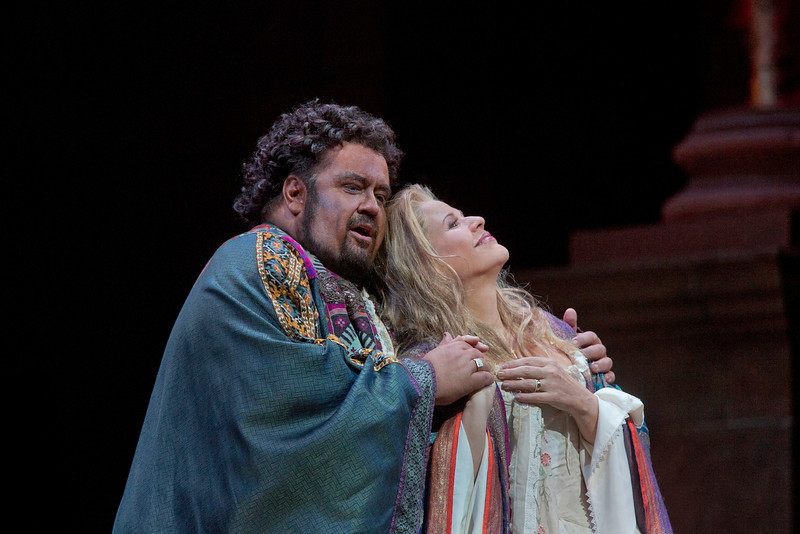Despite an ailing Moor, Fleming and Struckmann provide dramatic fire in Met’s “Otello”

Johan Botha in the title role and Renée Fleming as Desdemona in Verdi’s “Otello.”
Photo: Ken Howard/Metropolitan Opera
For Metropolitan Opera regulars with long memories, Tuesday night was not exactly an evening to erase memories of Placido Domingo, Jon Vickers or James McCracken.
The Met revived its aged but still handsome production of Verdi’s Otello with what looked on paper like a world-beater cast. But it became clear almost immediately that Johan Botha, in the title role of the Moorish general undone by his fatal jealousy for his beautiful bride Desdemona, was not going to have a good night.
The South African tenor cracked badly in a less-than-heroic opening Esultate! Isolated high notes were occasionally clarion but much of Botha’s singing was painfully effortful, as in his clearly underpowered contribution to an unbalanced Si, pel ciel. After intermission an announcement was made that the singer was suffering from allergies but had decided to continue and asked for the audience’s indulgence. Botha improved somewhat in the latter half and provided his finest singing in the final act with a notably nuanced and expressive Niun mi tema. But this was not exactly Verdi singing for the ages, with Botha’s generalized acting adding to the sense of a, well, unmoored characterization.
There was nothing half-hearted about the Iago of Falk Struckmann. The German bass-baritone wholly inhabited the role of Otello’s duplicitous confidante, both vocally and dramatically. There are more Italianate Iagos to be sure, but Struckmann sang with unfailing dramatic point and involvement, his slight raspy undertone aptly suited to the odious villain. Struckmann brought a sinuous elegance to the role, delivering a swaggering Brindisi and commandingly venomous Credo, fairly spitting out his contempt for the Moor, humanity and himself with evil relish.
For some Chicago-based observers it’s hard not to grow a bit cynical about the staged media events and heavy-breathing press releases related to Renée Fleming’s much-hyped creative consultancy at the Lyric Opera. Thus it was heartening to be reminded of what a truly great artist she can be when in her element on stage in the right role.
Desdemona was an early Fleming triumph at the Met and it remains one of her most congenial roles, vocally and temperamentally. The soprano’s voice is not the rich, resplendent instrument of a decade ago when she sang Desdemona at the Lyric Opera (a production that begat Ben Heppner’s vocal crisis). And while the tone is more slender, the dramatic engagement and emotional intensity have deepened even more. Fleming can still break your heart, as with her vulnerable, pure-toned Willow Song Tuesday night. She brought dramatic credibility to the role, from the loving cheerful wife to her confusion at Otello’s accusations, her stricken humiliation at his public denouncement and a transfigured radiance in Desdemona’s Ave Maria. The climactic scene had a riveting cinematic intensity with Fleming gamely falling hard off the high bed and rolling down two steps.
The production could have used more effective visual moments like that. Too many crucial scenes went off the boil with David Kneuss’s direction looking and feeling underrehearsed. Eleanor Fazan’s dubious choreography was distracting at best, comical at worst with the men’s chorus two-step bopping during Iago’s Brindisi suggesting a Grease roadshow in Passaic.
With his youthful, vibrant tenor, Michael Fabiano made a more dashing and substantial Cassio than the usual weak, manipulated cypher. Renée Tatum was a compassionate Emilia, with Eduardo Valdes as Roderigo, Stephen Gaertner as Montano, Luthando Qave as a herald, and an authoritative James Morris—luxury casting as Ludovico—rounding out the cast.
The venerable Michael Yeargan-Elijah Moshinsky production remains imposing with its towering columns, soaring four-story Renaissance paintings and Canaletto-like long-lined elegance. Duane Schuler’s chiaraoscuro lighting was unfailingly evocative if a bit too oscura in the opening scene. Donald Palumbo’s chorus sang magnificently throughout the evening with power, gleam and dynamic sensitivity as needed.
Much of the credit for the evening’s success belongs to Semyon Bychkov and the Met Orchestra. The alarmingly unbridled tempest whipped up in Act 1 seemed to pressge an overheated Russian approach to Verdi. Yet while dramatic moments had daunting power and crackling electricity, Bychkov also found great delicacy in the score as with the luminous string playing in Desdemona’s chamber. The conductor also drew out the full array of Verdi’s sonic palette as with the ominous bass treads and the sickly low winds as Iago’s poison begins to take hold on Otello’s psyche.
Otello runs through October 27 and again from March 11-30. The March performances will star Jose Cura, Krassimira Stoyanova and Thomas Hampson and will be conducted by Alain Altinoglu. Metoperafamily.org.
Posted Oct 12, 2012 at 7:37 am by S Daniel
I saw Renee Fleming in La Traviata in London in 2009 and was so impressed with her expressive singing. Since then I’ve seen here several times on Met in HD broadcasts where she has seemed less compelling. [As a host she seems a bit insecure, so I’m not surprised there is hype involved in the Lyric position.] Glad she was back on form for Otello.